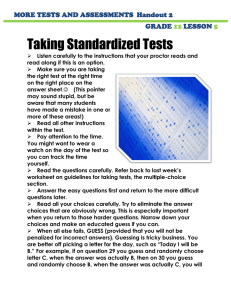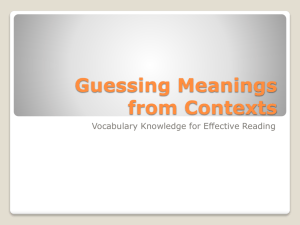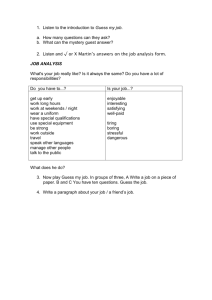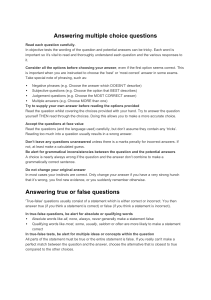OBJECTIVE
advertisement
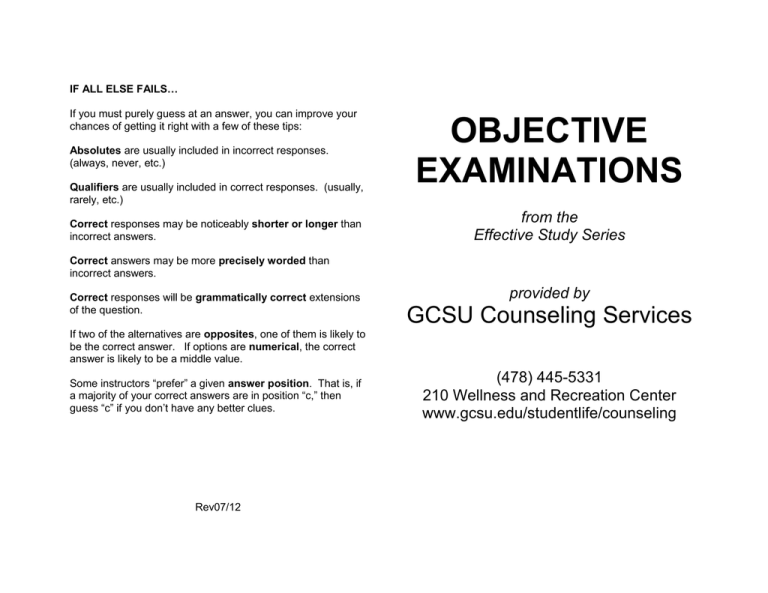
IF ALL ELSE FAILS… If you must purely guess at an answer, you can improve your chances of getting it right with a few of these tips: Absolutes are usually included in incorrect responses. (always, never, etc.) Qualifiers are usually included in correct responses. (usually, rarely, etc.) Correct responses may be noticeably shorter or longer than incorrect answers. OBJECTIVE EXAMINATIONS from the Effective Study Series Correct answers may be more precisely worded than incorrect answers. Correct responses will be grammatically correct extensions of the question. provided by GCSU Counseling Services If two of the alternatives are opposites, one of them is likely to be the correct answer. If options are numerical, the correct answer is likely to be a middle value. Some instructors “prefer” a given answer position. That is, if a majority of your correct answers are in position “c,” then guess “c” if you don’t have any better clues. Rev07/12 (478) 445-5331 210 Wellness and Recreation Center www.gcsu.edu/studentlife/counseling Objective examinations are objective only in terms of the scoring process. They allow no room for judgment and no margin for error in responding. Typically, they require only recognition of the correct answer (multiple choice, true/false, matching), rather than the total recall of previously learned material (essay, short answer). The one exception is fill-inthe-blank items, which may be scored either objectively or subjectively depending on test construction and purpose. Do not be lulled into a false sense of security by this format, however. Objective tests can measure higher order mental processes such as analytical and reasoning skills. You do not necessarily have to know the material any less just because you have an objective exam! If you know the material, but have trouble with objective tests, the following suggestions should help to increase your scores. Briefly look over the entire examination. Find out what you are getting into. How long is it? Will you need to budget your time on various sections? Read the directions carefully. Are you to simply respond or must you correct false answers? Is there only one correct choice, or may you choose all correct answers? Is there a penalty for guessing? Read each item carefully. Don’t lose points by carelessly responding to what you thought might be asked. Go through the test answering easy items first. This is important because: It will get you mentally “in tune” with the material. It will increase your confidence and assist you in recalling additional information. Accept the questions at face value. Don’t try to read too much into them or look for tricks. Most instructors are honestly trying to find out how much you know, not how clever you are at finding the trick. HINT: The answers to some questions may actually be given in the statements of other questions! If you don’t understand a question, ask for clarification. If for any reason the instructor will not clarify it, break it down into smaller segments or try to re-word it so you can understand it. If you think you know an answer, but aren’t sure, mark your best response, then come back to the question later. Do not change your first impression without good reason! Read every response option! Don’t just mark the first one that “seems logical.” Answer every question, unless there is a penalty for guessing. You might guess correctly, but you can’t possibly get credit for an omitted answer. If you have time, re-read your answers to make sure you haven’t made any silly mistakes. If these tips don’t work for you, a counselor can help you with an individualized plan. Call (478) 445-5331 or come by 210 Wellness and Recreation Center for an appointment.
